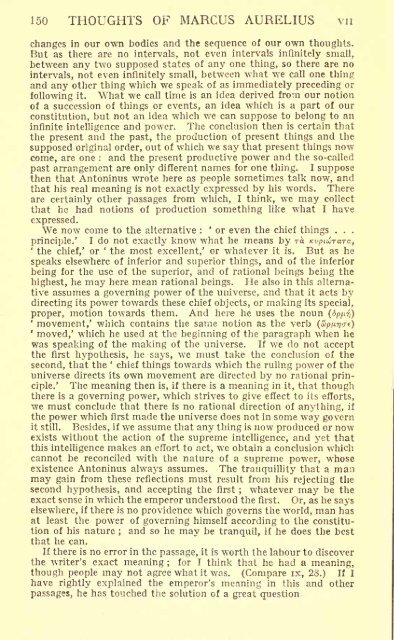The Thoughts of Marcus Aurelius - College of Stoic Philosophers
The Thoughts of Marcus Aurelius - College of Stoic Philosophers
The Thoughts of Marcus Aurelius - College of Stoic Philosophers
Create successful ePaper yourself
Turn your PDF publications into a flip-book with our unique Google optimized e-Paper software.
150 THOUGHTS OF MARCUS AURELIUS vn<br />
changes in our own bodies and the sequence <strong>of</strong> our own thoughts.<br />
But as there are no intervals, not even intervals infinitely small,<br />
between any two supposed states <strong>of</strong> any one thing, so there are no<br />
intervals, not even infinitely small, between what we call one thine<br />
and any other thing which we speak <strong>of</strong> as immediately preceding or<br />
following it. What we call time is an idea derived from our notion<br />
<strong>of</strong> a succession <strong>of</strong> things or events, an idea which is a part <strong>of</strong> our<br />
constitution, but not an idea which we can suppose to belong to an<br />
infinite intelligence and power. <strong>The</strong> conclusion then is certain that<br />
the present and the past, the production <strong>of</strong> present things and the<br />
supposed original order, out <strong>of</strong> which we say that present things now<br />
come, are one : and the present productive power and the so-called<br />
past arrangement are only different names for one thing. I suppose<br />
then that Antoninus wrote here as people sometimes talk now, and<br />
that his real meaning is not exactly expressed by his words. <strong>The</strong>re<br />
are certainly other passages from which, I think, we may collect<br />
that he had notions <strong>of</strong> production something like what I have<br />
expressed.<br />
We now come to the alternative : or even the chief things . . .<br />
principle. I do not exactly know what he means by TU KvptArarc.,<br />
the chief, or the most excellent, or whatever it is. But as he<br />
speaks elsewhere <strong>of</strong> inferior and superior things, and <strong>of</strong> the inferior<br />
being for the use <strong>of</strong> the superior, and <strong>of</strong> rational beings being the<br />
highest, he may here mean rational beings. He also in this alterna<br />
tive assumes a governing power <strong>of</strong> the universe, and that it acts by<br />
directing its power towards these chief objects, or making its special,<br />
proper, motion towards them. And here he uses the noun<br />
(&lt;5p/ir,)<br />
movement, which contains the same notion as the verb (uip/^o-e)<br />
moved, which he used at the beginning <strong>of</strong> the paragraph when he<br />
was speaking <strong>of</strong> the making <strong>of</strong> the universe. If we do not accept<br />
the first hypothesis, he says, we must take the conclusion <strong>of</strong> the<br />
second, that the chief things towards which the ruling power <strong>of</strong> the<br />
universe directs its own movement are directed by no rational prin<br />
ciple. <strong>The</strong> meaning then is, if there is a meaning in it, that though<br />
there is a governing power, which strives to give effect to its efforts,<br />
we must conclude that there is no rational direction <strong>of</strong> anything, if<br />
the power which first made the universe does not in some way govern<br />
it still. Besides, if we assume that any thing is now produced or now<br />
exists without the action <strong>of</strong> the supreme intelligence, and yet that<br />
this intelligence makes an effort to act, we obtain a conclusion which<br />
cannot be reconciled with the nature <strong>of</strong> a supreme power, whose<br />
existence Antoninus always assumes. <strong>The</strong> tranquillity that a man<br />
may gain from these reflections must result from his rejecting the<br />
second hypothesis, and accepting the first ;<br />
whatever may be the<br />
exact sense in which the emperor understood the first. Or, as he says<br />
elsewhere, if there is no providence which governs the world, man has<br />
at least the power <strong>of</strong> governing himself according to the constitu<br />
tion <strong>of</strong> his nature ;<br />
and so he may be tranquil, if he does the best<br />
that he can.<br />
If there is no error in the passage, it is worth the labour to discover<br />
the writer s exact meaning for I ;<br />
think that he had a meaning,<br />
though people may not agree what it was. (Compare ix, 28.) If I<br />
have rightly explained the emperor s meaning in this and other<br />
passages, he has touched the solution <strong>of</strong> a great Question

















